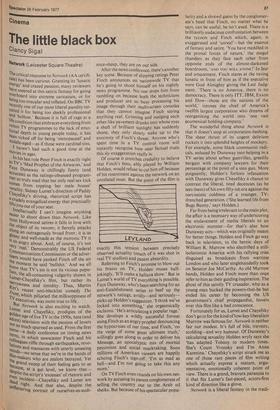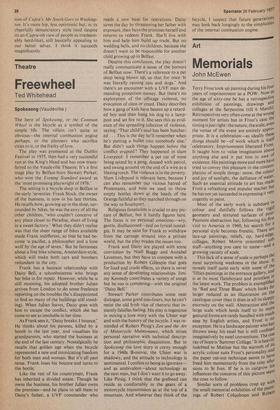Cinema
The little black box
Clancy Sigal
Network (Leicester Square Theatre)
The critical response to Network (AA certificate) has been curious. Granting its 'lunatic
energy' and crazed passion, many reviewers
have sneered at this satiric fantasy for going overboard into extreme caricature, or for
being too oracular and inflated. On BBC TV
recently one of our most liberal pundits tuttuned it for being too sleekly professional and 'hollow.' Because it is full of rage at a life condition that embraces everything from rotten TV programmes to the lack ofemo
ti i onal depth in young people today, t has been ticked off for being 'menopausal' and
Middle-aged—as if those were cardinal sins. haven't had such a good time at the Movies in ages.
In his last role Peter Finch is exactly right as TV's 'Mad Prophet of the Airwaves, and
EaYe Dunaway is chillingly funny (and accurate) as the ratings-obsessed programmer so truly mad that her only real sex kick comes from topping her male bosses venality. Sidney Lumet's direction of Paddy Chayefsky's driving, rhetorical script has a.. crudely evangelical energy that practically lifts you out of your seat. Intellectually I can't imagine anything easier to shoot down than Network. Like
Most Hollywood satires it falls in love with
the object of its venom; it fiercely attacks "ng an outrageously broad front; it is as 1°ssY and well-made as the moronic TV it is so angry about. And, of course, it's not erY 'real.' Demonstrably the US Federal .`trmninunications Commission or the adver tisers would have yanked Finch off the air !1,1e moment he said 'bullshit.' And we all ;.nen.v that TV's sin is not its vicious popuILIsm, the all-consuming vulgarity shown in „urnet-Chayefsky 's film, but rather its ,1,,arro vv plitt' sness and timidity. Thus, Martin recent anti-blacklist comedy The Which pilloried the milksoppiness of I V executives, was more true to life. flut Network is also exciting to watch. Lumet and Chayefsky, prodigies of the
WI:len age of live TV in the 1950s, hate (and
aclore) television with the passion of lovers snot so much spurned as used. From the first ;ene—a daily conference on timing news 'erns, in which newscaster Finch and his icolleagues riffle through earthquakes, revo
u!ions and massacres with utterly unseeing
71,111ds—vve sense that we're in the hands of `triakers who are zealots betrayed. Yet 'Lite grand sweep of their feeling gets to us eatise, at a gut level, we know that— despite the script's 'excesses' of rhetoric and !yen incident—Chayefsky and Lumet are "-lead right. And that also, despite the unflattering portrait of ourselves-as-audi
ence-sheep, they are on our side.
After the news conference, there's another key scene. Because of slipping ratings Peter Finch announces on nationwide TV that he's going to shoot himself on his nightly news programme. No one stops him from rambling on because both the technicians and producer are so busy processing his image through their multi-screen consoles that they cannot imagine Finch saying anything real. Grinning and nudging each other like pavement drunks into whose eyes a shaft of brilliant sunlight has suddenly shone, they only slowly wake up to the enormity of Finch's threat. Anyone who's spent time in a TV control room will instantly recognise how near factual truth this sly exaggeration really is. Of course it stretches credulity to believe that Finch's boss, ably played by William Holden, would refuse to cut him off because of his resentment against the network on an unrelated issue. But the point of the film is
exactly this tension between precisely observed actuality (much of it was shot in real TV studios) and Patent absurdity.
Referring to Finch's promise to blow out his brains on TV, Holden muses half
jokingly, make a helluva show.' But in Lumet's world of TV everything is possible. Faye Dunaway, who's been searching for an anti-Establishment series to beef up the network's ratings, avidly—and seriously— picks up Holden's suggestion. 'I think we've locked into something,' she orgasmically exclaims. 'He's articulating a popular rage.' She develops a wildly successful format using Finch as an angry prophet denouncing the hypocrisies of our time, and Finch, 'on the verge of some great ultimate truth,' willingly goes along in order to deliver his Message, an apocalyptic mix of morbid pessimism and social muckraking. Soon millions of American viewers are happily echoing Finch's sign-off: 'I'm as mad as hell—and I'm not going to take this any more.'
On TV Finch even rounds on his own network by accusing its parent conglomerate of selling the country out to the Arab oil sheiks. But because of his spectacular popu larity and a shrewd guess by the conglomerate's head that Finch, no matter what he says, can be useful, he isn't axed. There is a brilliantly audacious confrontation between the tycoon and Finch which, again, is exaggerated and 'unreal'—but the essence of fantasy and satire. 'You have meddled in the primal forces of nature,' the mogul thunders as they face each other from opposite ends of the almost-darkened boardroom, 'AND YOU WILL ATONE!' In fear and amazement, Finch stares at the raving lunatic in front of him as if the executive were God Almighty giving the Last Judgment. 'There is no America, there is no democracy. There is only ITT, IBM, Exxon and Dow—those are the nations of the world,' intones the chief of America's twelfth largest corporation who dreams of reorganising the world into 'one vast ecumenical holding company.'
The wonderful thing about Network is that it doesn't stop at corporation-bashing. The sheer thrust of its cogent delirium rockets it into splendid heights of mockery. For example, some black communist radicals, seduced by Dunaway into helping in a TV series about urban guerrillas, greedily bargain with company lawyers for their percentage at the point of a sten gun. More poignantly, Holden's forlorn infatuation with Dunaway gives Chayefsky a chance to contrast the liberal, tired decencies (as he sees them) of his own fifty-ish era against the narcissistic coldness of a younger, TVdrenched generation. (`She learned life from Bugs Bunny,' says Holden.)
Far from being irrelevant to the main plot, the affair is a necessary way of underscoring the enslavement of media liberals to an electronic monster—for that's also how Dunaway acts—which was originally meant for better things. Holden and Finch go way back in television, to the heroic days of William R. Murrow who electrified a stillisolationist America with his rallying cries disguised as broadcasts from wartime London and who later singlehandedly took on Senator Joe McCarthy. As old Murrow hands, Holden and Finch more than once refer to him as their guiding inspiration. The ghost of this saintly TV crusader, who as a young man bucked the powers-that-be but ended his career by becoming the US government's chief propagandist, hovers over this film like a bad conscience.
Fortunately for us, Lumet and Chayefsky don't go in for the kind of low-key liberalism Murrow was famous for. Network is neither fair nor modest. It's full of bile, travesty, scolding—and wry humour. Of Dunaway's calculating sexuality Holden wryly says she 'has adapted Tolstoy to modern times. She's Count Vronsky and I'm Anna Karenirta.' Chayefsky's script struck me as one of those rare pieces of film writing which actually express a mature, argumentative, emotionally coherent point of view. There is a grand, bravura paranoia to it that fits Lumet's fast-paced, actors-first kind of direction like a glove.
Network is a liberal fantasy in the tradi
tion of Capra's Mr Smith Goes to Washington. It's more hip, less optimistic but, in its cheerfully denunciatory style (and despite its un-Capra-ish view of people as irredeemably herd-like), still basically appealing to our better selves. I think it succeeds magnificently.



































 Previous page
Previous page